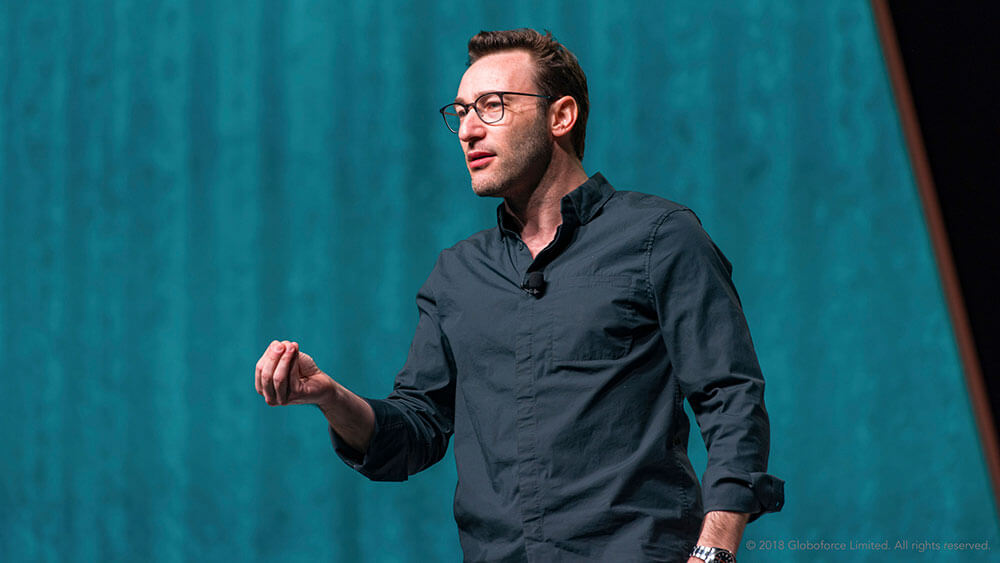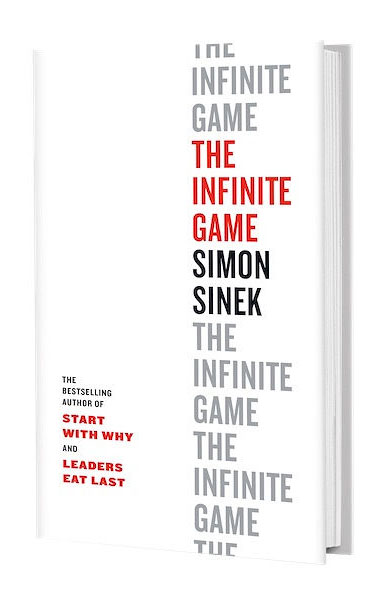
Author Simon Sinek will give the Jan. 6 opening keynote at PCMA Convening Leaders 2020 in San Francisco. (Courtesy WorkHuman)
 How do you win a game that has no end? Bestselling author and self-described “unshakable optimist” Simon Sinek poses the question on his website and explores the answer in his new book, The Infinite Game, which offers a framework for approaching leadership and doing business in a new way.
How do you win a game that has no end? Bestselling author and self-described “unshakable optimist” Simon Sinek poses the question on his website and explores the answer in his new book, The Infinite Game, which offers a framework for approaching leadership and doing business in a new way.
Unlike finite games (think football), infinite games have infinite time horizons, no metrics, no endings. “There is no such thing as ‘winning’ an infinite game,” Sinek writes. The goal, for the players — or businesses and organizations — is to keep playing and thriving. And to achieve an infinite mindset, he says, leaders must follow five essential practices:
- Advance a just cause — offer employees a cause so just that they would be willing to sacrifice their own interests to advance it.
- Build trusting teams — be a leader who creates an environment in which people feel safe in order to be their best and true selves.
- Study your worthy rivals — or other players in the infinite game whose strengths reveal your weaknesses, giving you an opportunity to improve.
- Prepare for existential flexibility — or the ability to make profound strategic shifts to better advance your cause.
- Demonstrate the courage to lead — think chain drugstore CVS’ decision to stop selling cigarettes.
Sinek will share why he believes leaders with an infinite mindset are crucial to an organization’s success — and outline the path to develop that mindset — in his Jan. 6 Opening Session Keynote at PCMA Convening Leaders 2020 in San Francisco. He recently spoke with Convene.
In a world where many business leaders describe progress, or the lack of it, using sports terminology, the infinite game approach is a pretty radical idea. Are you finding people are open to it?
There are some people who reject it outright. … My message is very, very pro capitalist, but it’s pro capitalism the way it’s supposed to work, not the way it works now. Because capitalism today is almost an exclusively finite thing. The capitalism that Thomas Jefferson embraced, the capitalism that helped America become what it is today, is not the form of capitalism we practice. … I want to return to a form of capitalism that’s actually productive for more people. And healthier for companies, by the way.
Can you give me an example of your thinking?
Using mass layoffs in an annualized business is a terrible idea for capitalism. Putting a shareholder before a customer is a terrible idea for capitalism. Those are finite-oriented things that are good for the people who don’t own the business and who don’t do business with the business. … Companies get punished by Wall Street when they reinvest in themselves. What? And then their stock price goes up when they announce mass layoffs. What? Basically outside parties are putting massive pressure on executives to make decisions that those executives know are bad for their companies and yet they do it anyway. So I’m simply taking what people talk about in the shadows. Because every C-level executive at every public company on the planet will privately acknowledge what a complete joke Wall Street is. And yet Wall Street helps dictate what they do. I’m just saying out loud what they all wish they could say or want to say.
 How long will a shift like this take?
How long will a shift like this take?
Well, it took 20 to 30 years for us to get to where we are now. It’s going to take 20 or 30 years for us to reverse it. And some of the executives that are die-hard Jack Welch followers, [where] shareholder supremacy rules, frankly, we just have to wait for them to die. And the good news is they’re older, they’re baby boomers. So we’re good. I don’t have to fight with them. I just have to wait them out.
So, an infinite game, right?
Right. I don’t have to win. I just have to wait and I have to build foundations of strength for this succession. … I spend zero time trying to convince senior managers who think I’m an idiot. I just ignore them. … But look, momentum is on our side, and there are a few indicators. First of all, it’s a joke that I have a career. I talk about trust and cooperation, there should be no demand for my work. But there is. And my books keep selling, which is a sign that what I’m offering is missing and people want it. If I was preaching this message in the ’80s or ’90s, I would sell zero books. So the time is right.
What keeps businesses locked in a finite game?
I think a lot of leaders think they’re responsible for the results, which is false. They’re responsible for the people who are responsible for the results. And they have to make that mental shift that as you get promoted through the ranks, you’re actually no longer responsible for getting the work done anymore. That’s your old job. You’re now responsible for the people who get the job done. And that’s a new skill set and a new job entirely. And I think a lot of people don’t make that transition. … We don’t train people when we put them in leadership positions. And so why are we surprised that they’re not good leaders?
What, if anything, is making you optimistic right now?
We saw recently the Business Roundtable make a public announcement about the importance of purpose and diminishing the importance of shareholder value. Now, I’m cynical. I don’t [fully] believe them because I mean look at who the spokespeople were in that press release. It was Jamie Dimon from [JPMorgan Chase] who a few years ago announced record-high layoffs the same year they had record-high [executive] bonuses. How does that happen? And the CEO of Johnson & Johnson, which was recently fined over $500 million for their role in the opioid crisis. So they’re not exactly the best spokespeople for purpose-driven organizations. Not to mention the fact that last year they were shareholder driven. What happened?
I absolutely believe that executives can have transformative experiences. I’ve seen it happen but I want to know what theirs were, because I don’t know what’s happened, and I want to see what practices they’re changing inside their business. So the good news is that … those CEOs would even come out with a statement. That is a huge victory. … And they may have done it because they believed in it, or they may have done it because that’s what millennials want these days, or they may have done it because they had to because public pressure was extreme. I’ll take all of them. Now I want them to truly convert their businesses. And it’s a step in the right direction, as cynical as I am.
Are you sure you are an optimist?
Yeah, of course. We are marching in the right direction, and the fact that we can have an open conversation about having purpose at work is a big deal. Because when I started talking about this stuff over 10 years ago, it was the kind of thing that you whispered. And now the conversation is out loud, it’s an acceptable topic, that’s a big deal.
At Convening Leaders you’ll be speaking to event organizers. Are there specific things that they can take from your book and apply to events?
Yeah sure. I think there’s two … really important things. One is, even though the events themselves are finite … to be really successful in this business, it’s not simply producing a series of great events. There’s the context and the manner in which you show up and the reason why you want to do these events. Because if you’re just focused on the finite game, you’re just a commodity. … And I think the other thing is to embrace the concept of worthy rivalry. Instead of seeing the other players in the game as competitors to be beaten for each contract, start recognizing that some of them are better than you at certain things and their strengths reveal to you your weaknesses and those are opportunities to improve.
You’ve been to a lot of events. Do you see some that reflect an infinite mindset?
Hard to say. I mean, sometimes the themes of the conferences give some clues. … But you don’t really know if they mean it. It’s just the theme. But I think when the theme is “winning,” I think it’s a dead giveaway that they have a very finite mindset. So I don’t know that I can tell if they’re infinite minded, but I can tell if they’re finite minded.
What do you hope people take away from your Convening Leaders keynote?
My work challenges the perspective that people have on business. … In this [my] third book, I’m directly taking on how people think business works and I’m offering them a completely alternative perspective, which will challenge the way they think about their businesses. It’ll even challenge the way they think about how they live their lives and manage their careers.
Going back to your five essential practices, is there one thing people taking this path should start with?
Well, it’s kind of like [getting in shape], you’re asking me what should I do first? Should I eat right, get sleep, exercise, or nurse my personal relationships? The answer’s ‘yes.’ I don’t care, just pick one. … Eventually, you’re going to have to do them all, but the order doesn’t really matter. Just start.
Cristi Kempf is Convene executive editor. This interview has been edited for length and clarity.

